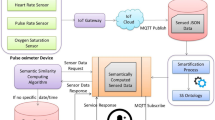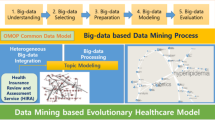Abstract
Due to recent growing interest, the importance of preventive and efficient healthcare using big data scattered throughout various IoT devices is being emphasized in healthcare, as well in the IT field. The analysis of information in healthcare is mainly prediction using a user’s basic information and static data from a knowledge base. In this study, a knowledge-based dynamic cluster model using a convolutional neural network (CNN) is suggested for healthcare recommendations. The suggested method carries out a process to extend static data and a previous knowledge base from an ontology-based ambient-context knowledge base beyond knowledge-based healthcare management, which was the focus of previous study. It is possible to acquire and expand a large amount of high-quality information by reproducing inferred knowledge using a CNN, which is a deep-learning algorithm. A dynamic cluster model is developed, and the accuracy of the predictions is improved in order to enable recommendations on healthcare according to a user environment that changes over time and based on environmental factors as dynamic elements, rather than static elements. Also, the accuracy of the predictions is verified through a performance evaluation between the suggested method and the previous method to validate effectiveness, and an approximate 13% performance improvement was confirmed. Currently, the acquisition of knowledge from unstructured data is in its early stages. It is expected that symbolic knowledge-acquisition technology from unstructured information that is produced and that changes in real time, and the dynamic cluster model method suggested in this study, will become the core technologies that promote the development of healthcare management technology.









Similar content being viewed by others
Notes
Prover9 and Mace4, https://www.cs.unm.edu/~mccune/prover9/.
The R project, www.r-project.org.
The R project, www.r-project.org.
References
Back Ji, Chung K, Kim J, Jung H (2019) Cloud-based ontology context mining using deep learning in healthcare. IJITEE 8(2):296–300
Jung H, Chung K (2016) PHR based life health index mobile service using decision support model. Wirel Pers Commun 86(1):315–332
Jung E, Kim J, Chung K, Park D (2014) Mobile healthcare application with EMR interoperability for diabetes patients. Cluster Comput 17(3):871–880
Center for Health Industry Information & Statistics (2015) Weekly healthcare industry trends. Korea Health Industry Development Institute, no 155, pp 1–2
Jung H, Chung K (2016) Life style improvement mobile service for high risk chronic disease based on PHR platform. Cluster Comput 19(2):967–977
Kim JC, Chung K (2017) Depression index service using knowledge based crowdsourcing in smart health. Wirel Pers Commun 93(1):255–268
Jung H, Chung K (2016) Knowledge-based dietary nutrition recommendation for obesity management. Inf Technol Manag 17(1):29–42
Ngiam J, Khosla A, Kim M, Nam J, Lee H, Ng AY (2011) Multimodal deep learning. In: Proceedings of the 28th international conference on international conference on machine learning, pp 689–696
Shin DH, Choi KH, Kim CB (2017) Deep learning model for prediction rate improvement of stock price using RNN and LSTM. J Korean Inst Inf Technol 15(10):9–16
Kim JC, Chung K (2018) Neural-network based adaptive context prediction model for ambient intelligence. J Ambient Intell Humaniz Comput. https://doi.org/10.1007/s12652-018-0972-3
Chung K, Park RC (2018) Chatbot-based healthcare service with a knowledge base for cloud computing. Cluster Comput. https://doi.org/10.1007/s10586-018-2334-5
Jung H, Yang J-G, Woo J-I, Lee BM, Ouyang J, Chung K, Lee Y-H (2015) Evolutionary rule decision using similarity based associative chronic disease patients. Cluster Comput 18(1):279–291
Jung H, Yoo H, Lee Y, Chung K-Y (2015) Interactive pain nursing intervention system for smart health service. Multimed Tools Appl 74(7):2449–2466
An J-Y, Seo E-R, Lim K-H, Shin J-H, Kim J-B (2013) Standardization of the Korean version of screening tool for depression. J Korean Soc Biol Ther Psychiatry 19(1):47–56
Chung K, Yoo H, Choe DE (2018) Ambient context-based modeling for health risk assessment using deep neural network. J Ambient Intell Humaniz Comput. https://doi.org/10.1007/s12652-018-1033-7
Adomavicius G, Tuzhilin A (2011) Context-aware recommender systems. In: Recommender systems handbook, pp 217–253
Chaib A, Boussebough I, Chaoui A (2018) Adaptive service composition in an ambient environment with a multi-agent system. J Ambient Intell Humaniz Comput 9(2):367–380
Korea Centers for Disease Control and Prevention (2016) 7th Korean National Health and Nutrition Examinations Survey (KNHANES V-1). Centers for Disease Control and Prevention, Retrieved from https://knhanes.cdc.go.kr
Cho CS, An DU, Jeong SJ, Lee SW (2003) K-means clustering method according to documentation numbers. In: Proceedings of the international conference on electronics, information, and communication, pp 1557–1560
Kim W, Kim S (2014) Document clustering technique by K-means algorithm and PCA. J Korea Inst Inf Commun Eng 18(3):625–630
Jung H, Chung KY, Lee YH (2015) Decision supporting method for chronic disease patients based on mining frequent pattern. Multimed Tools Appl 74(20):8979–8991
Yoo H, Chung K (2018) Heart rate variability based stress index service model using bio-sensor. Cluster Comput 21(1):1139–1149
Chung K, Kim JC, Park RC (2016) Knowledge-based health service considering user convenience using hybrid Wi-Fi P2P. Inf Technol Manag 17(1):67–80
Jung H, Yoo H, Chung K (2016) Associative context mining for ontology-driven hidden knowledge discovery. Cluster Comput 19(4):2261–2271
Orciuoli F, Parente M (2017) An ontology-driven context-aware recommender system for indoor shopping based on cellular automata. J Ambient Intell Humaniz Comput 8(6):937–955
Chung K, Boutaba R, Hariri S (2014) Recent trends in digital convergence information system. Wirel Pers Commun 79(4):2409–2413
Kim JC, Chung K (2018) Mining health-risk factors using PHR similarity in a hybrid P2P network. Peer-to-Peer Netw Appl 11(6):1278–1287
Kim JC, Chung K (2017) Emerging risk forecast system using associative index mining analysis. Clust Comput 20(1):547–558
Chung K, Park RC (2017) Cloud based u-healthcare network with QoS guarantee for mobile health service. Clust Comput. https://doi.org/10.1007/s10586-017-1120-0
Song CW, Jung H, Chung K (2017) Development of a medical big-data mining process using topic modeling. Clust Comput. https://doi.org/10.1007/s10586-017-0942-0
Yoo H, Chung K (2018) Mining-based lifecare recommendation using peer-to-peer dataset and adaptive decision feedback. Peer-to-Peer Netw Appl 11(6):1309–1320
Baek JW, Kim JC, Chun J, Chung K (2019) Hybrid clustering based health decision-making for improving dietary habits. Technol Health Care. https://doi.org/10.3233/THC-191730
Choi SY, Chung K (2019) Knowledge process of health big data using mapreduce-based associative mining. Pers Ubiquit Comput. https://doi.org/10.1007/s00779-019-01230-3
Kim JC, Chung K (2019) Associative feature information extraction using text mining from health big data. Wirel Pers Commun 105(2):691–707
Jung H, Chung K (2015) Ontology-driven slope modeling for disaster management service. Clust Comput 18(2):677–692
Acknowledgements
This work was supported by a National Research Foundation of Korea (NRF) grant funded by the Korea government (MSIP; Ministry of Science, ICT & Future Planning) (No. 2018R1C1B5047242).
Author information
Authors and Affiliations
Corresponding author
Additional information
Publisher's Note
Springer Nature remains neutral with regard to jurisdictional claims in published maps and institutional affiliations.
Rights and permissions
About this article
Cite this article
Chung, K., Jung, H. Knowledge-based dynamic cluster model for healthcare management using a convolutional neural network. Inf Technol Manag 21, 41–50 (2020). https://doi.org/10.1007/s10799-019-00304-1
Published:
Issue Date:
DOI: https://doi.org/10.1007/s10799-019-00304-1




